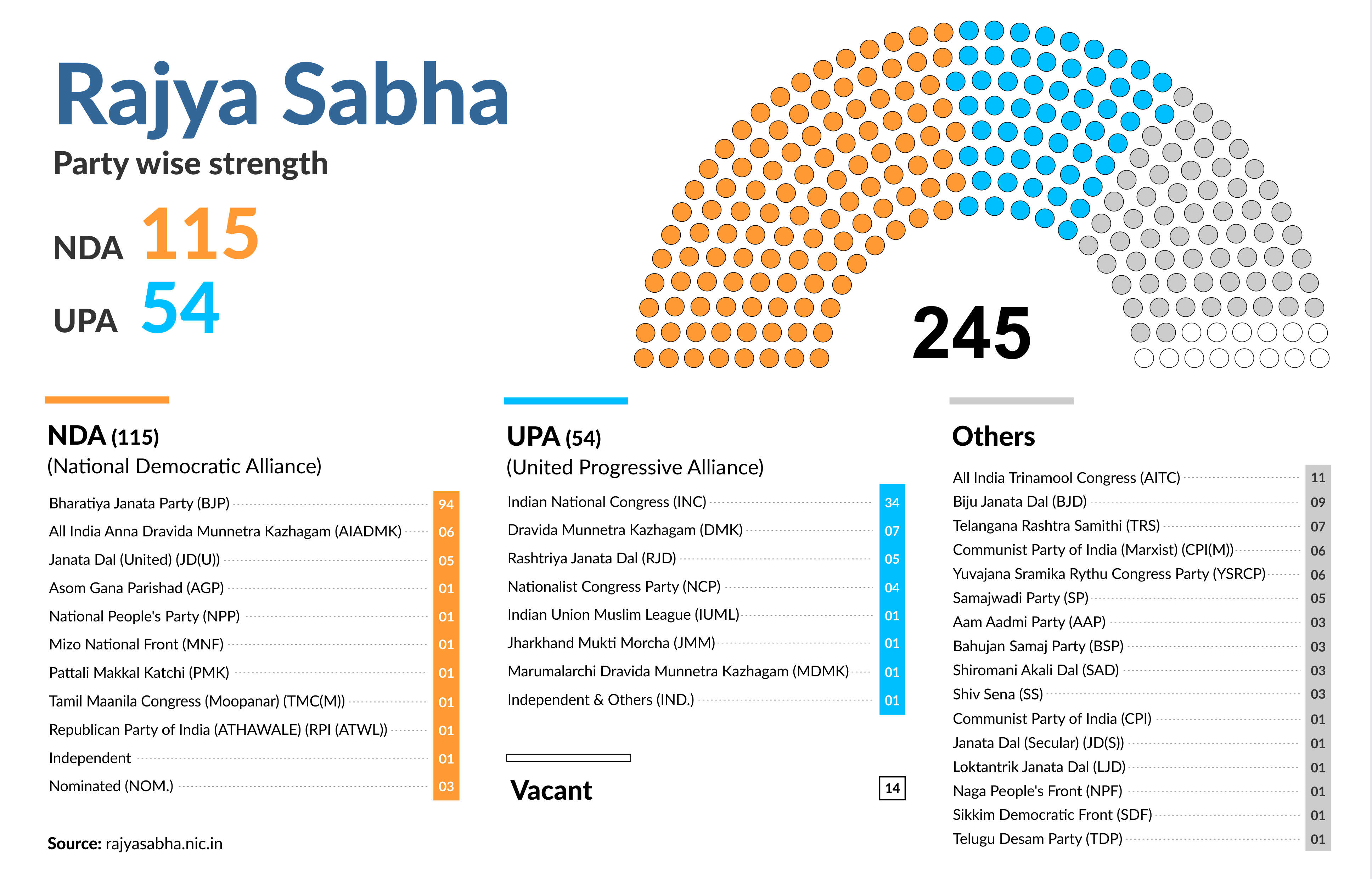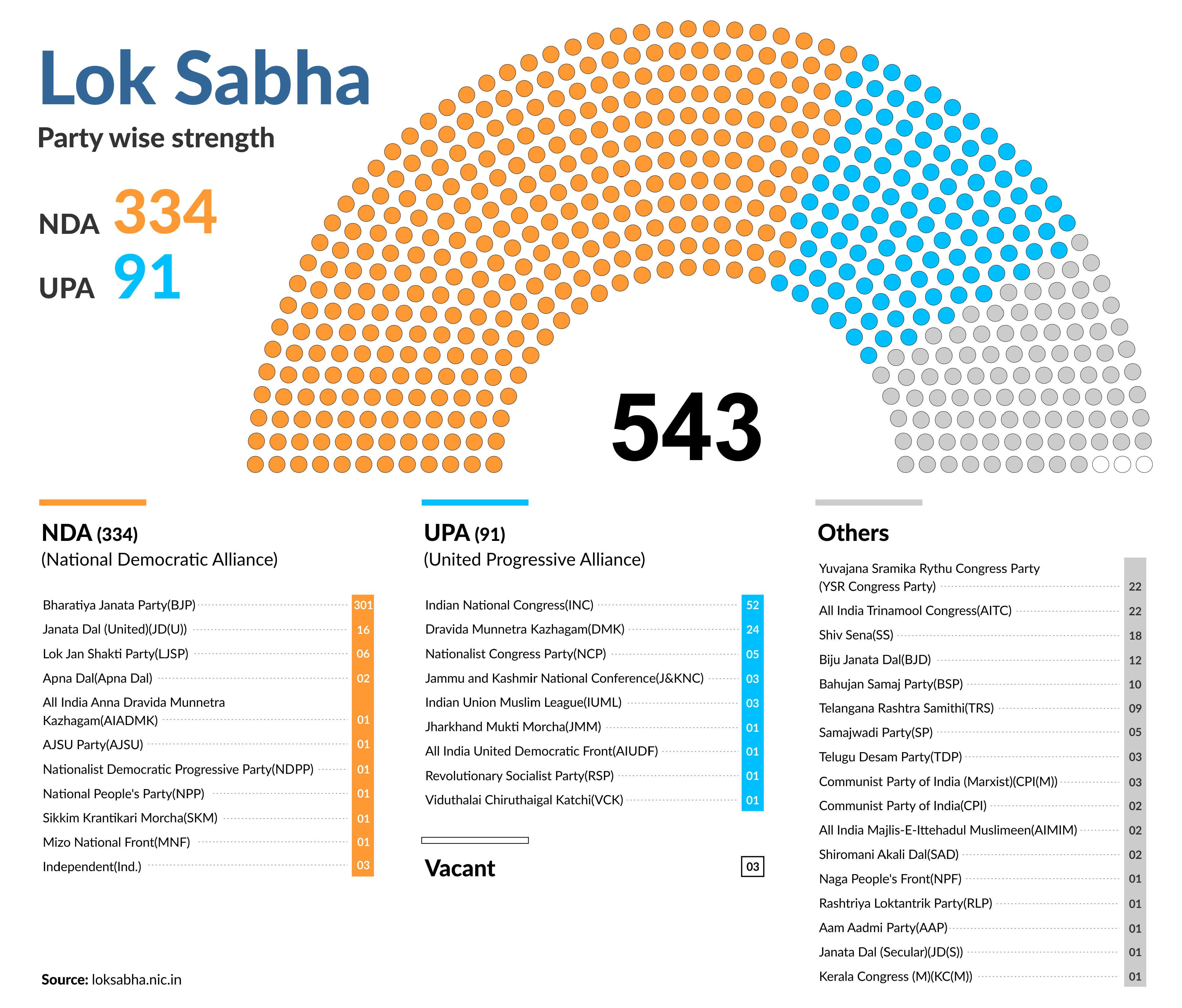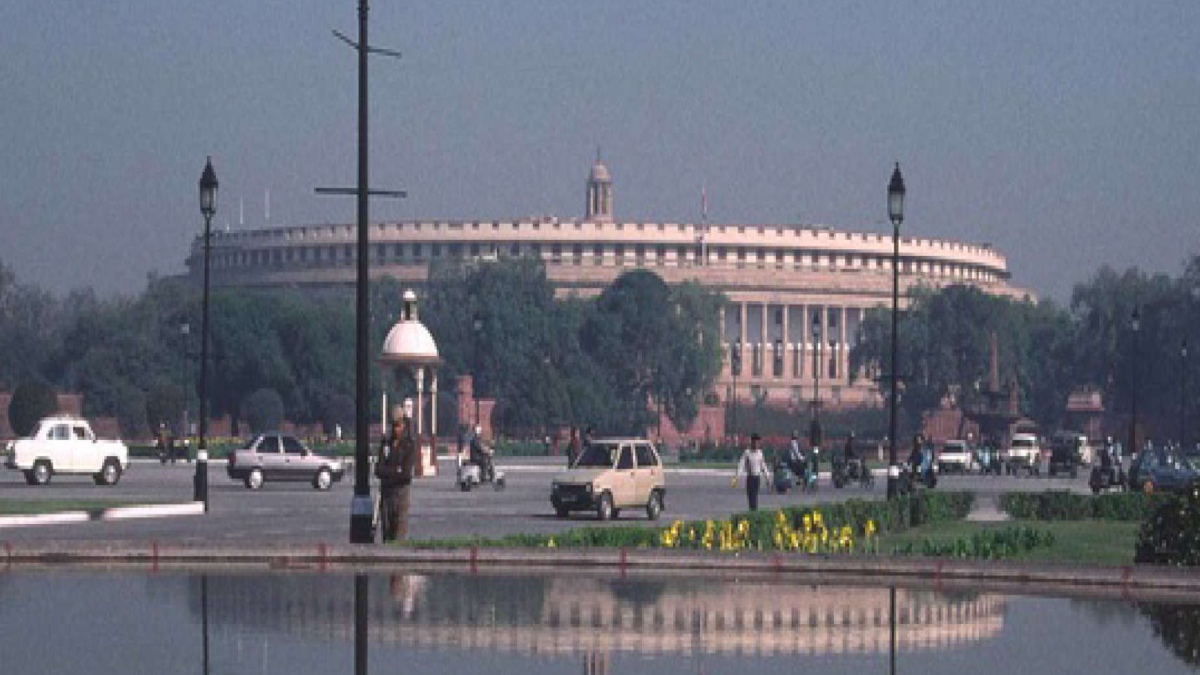The Monsoon Session of Parliament started on 19 July 2021, and will likely run for 19 business days until 13 August 2021. Over 400 Members of Parliament (MPs) and 200 staff have received the Covid-19 vaccinations before the start of the session. Covid-19 protocols, including maintaining social distancing are also in place, even as members of both houses have been sitting simultaneously for the sessions.
During the 19 days, as per the Ministry of Parliamentary Affairs, 31 government business items will be taken up, including 29 bills (in various stages) and two financial items. 26 bills have been tabled (including both Lok Sabha and Rajya Sabha), out of which nine are listed for consideration and passing, and 17 are listed for introduction, consideration, and passing. The first few days of the Monsoon Session have witnessed some turbulence, with parties protesting against the fuel price hikes, the government’s handling of the second wave of COVID-19, and the farm laws. The House has been adjourned several times in the past few days due to loud protests by opposition party members against various bills and ordinances. Union minister Bharati Pravin Pawar’s response to a written question, stating that no deaths due to lack of oxygen were specifically reported by states and Union Territories during the second wave, attracted widespread criticism and opposition. Key bills such as the Essential Defence Services Bill 2021, Maintenance and Welfare of Parents and Senior Citizens (Amendment) Bill 2019, and The Commission for Air Quality Management in National Capital Region and Adjoining Areas Bill, 2021 have attracted protests from various stakeholder groups across the country.
HOW IS A BILL PASSED IN PARLIAMENT?
The Rajya Sabha currently has 245 members, out of which 12 have been nominated directly by the President. Out of these 237 seats, the National Democratic Alliance (NDA) has 115 seats. The Lok Sabha has 545 members, out of which the NDA has 382 seats – 301 of these are the Bharatiya Janata Party’s (BJP). Any Constitution Amendment Bill must be passed by both Houses of Parliament and would require a simple majority of the total membership of that House, and a two-thirds majority of all members present and voting. Money and Financial Bills can only be introduced in the Lok Sabha by the recommendation of the President. Money Bills must be passed first in the Lok Sabha by a simple majority, following which it is sent to the Rajya Sabha for recommendations, which can be rejected by the Lok Sabha. Financial Bills must be passed by both Houses of Parliament. Ordinary Bills, on the other hand, can be introduced in either House and must be passed by both Houses by a simple majority of all members present and voting.
A CLOSER LOOK: WHAT DO THE BILLS ENTAIL?ESSENTIAL DEFENCE SERVICES BILL, 2021THE TRAFFICKING OF PERSONS (PREVENTION, PROTECTION AND REHABILITATION) BILL, 2021
The Essential Defence Services Bill aims to provide for the maintenance of essential defence services for the country’s security and will replace the Essential Defence Services Ordinance. The Ordinance empowers the government to prohibit strikes, lockouts, and layoffs in units that are involved in providing essential defence services. The bill will grant power to the government to act in the case of a strike against the corporatisation of ordnance factories. It also enables them to take disciplinary action, including penalties and dismissal, for participating in such strikes. The legislation will affect around 80,000 workers employed across Indian ordnance factories and other establishments.
Various trade union and employees groups such as the All India Defence Employees’ Federation (AIDEF) of Left unions; Bhartiya Pratiraksha Mazdoor Sangh (BPMS), an arm of RSS-affiliate Bharatiya Mazdoor Sangh; and Indian National Defence Workers’ Federation (INDWF) of the Indian National Trade Union Congress have registered strong opposition to the legislation. The federations have also declared an indefinite strike from 26 July despite the assurances by the government to take care of the employees’ conditions of service.
The main aim of the bill is to “prevent and counter trafficking in persons, especially women and children, and to provide for the care, protection, and rehabilitation to the victims while respecting their rights” while also “creating a supportive legal, economic and social environment for them.” The main features of the legislation include that it expands the definition of the “victim” to include transgenders, widens the range of offenders who can be charged under the law to include public servants and armed forces personnel, and calls for the setting up of a National Anti-Trafficking Committee. Penalties and imprisonment under the law have also been made more severe, especially for “aggravated offences”. However, the bill has attracted objections from lawyers, human rights activists, and civil society members.
Legal experts say that the bill criminalizes sex work and does not provide exit or rehabilitation options for people who are in the profession voluntarily. Additionally, they point out that trafficking and sex work have been made to overlap in the bill, which means that prostitution and pornography have been added in the definition of sexual exploitation. Legal experts have pointed out that making the consent of the victim irrelevant in the bill will put voluntary sex workers in prison. The bill was also only put online for public comments for two weeks (in English only), leading to criticism about it not being accessible to those it affects the most.

ELECTRICITY (AMENDMENT) BILL, 2021
The Electricity (Amendment) Bill,2021 seeks to amend the existing Electricity Act, 2003 and will set the framework for devising and enforcing rules for electricity by regulatory authorities in the power sector. Under the bill, power distribution will be de-licensed to increase competition and will be privatized to allow consumers to choose from multiple service providers. The bill has attracted widespread opposition from stakeholder groups, including trade unions and political parties.
 Photograph by Wikimedia Commons
Photograph by Wikimedia Commons Photograph by Wikimedia Commons
Photograph by Wikimedia Commons
The All India Power Engineers Federation (AIPEF) has stated that major key stakeholders are being ignored in the process of finalizing the bill, and the privatisation of power distribution will lead to bankruptcy amongst major state DISCOMs. They also mention that the decision to de-license power distribution will not ensure an efficient and cost-effective electricity supply. Members of the Aam Aadmi Party (AAP) and Sanyukta Kisan Morcha (SKM) also opposed the introduction of the Bill, stating that it will take away the rights of state governments.
INDIAN MARINE FISHERIES BILL, 2021
The Indian Marine Fisheries Bill, 2021 proposes to grant licenses to vessels registered under the Merchant Shipping Act, 1958, to fish in the exclusive economic zone (EEZ). It also puts the Indian Coast Guard (ICG) in charge of Monitoring Control and Surveillance (MCS), and proposes punishments for fishermen breaching the EEZ without a licence, for not complying with ICG orders, and for obstructing ICG officials. The bill has attracted criticism from political parties and fishermen’s groups. Earlier this month Tamil Nadu Chief Minister M.K. Stalin wrote to Prime Minister Narendra Modi against the bill and said that it went against the interests of the local fishermen and certain clauses infringed upon the rights of the states. Fishermen’s groups have said that the bill does not take into account the traditional rights of fishermen, and the fines prescribed for fishermen with non-motorised traditional crafts are hefty. The groups have also touched upon the fact that the bill was introduced without consultation with stakeholder groups and the public. Fishermen’s groups have been holding black flag protests across the country against the bill being introduced in the Parliament.









